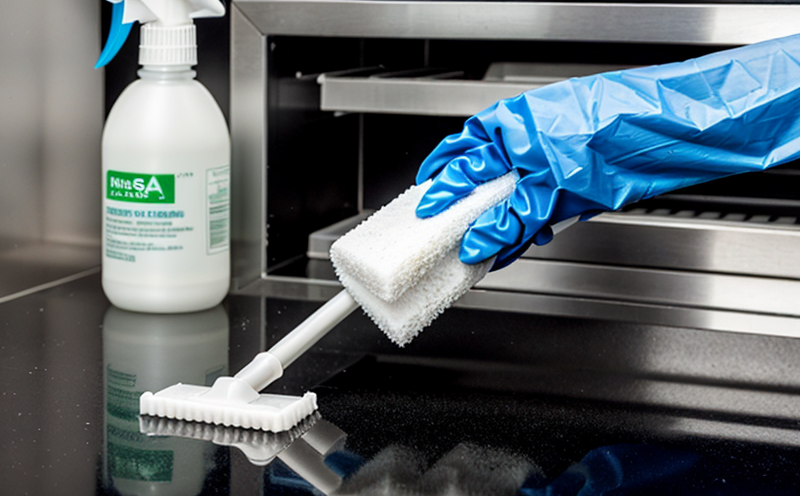DIN EN ISO 846 Plastics Disinfection Resistance Testing
The DIN EN ISO 846 standard is a widely recognized guideline that evaluates the disinfection resistance of plastics intended for use in hygiene and healthcare applications. This test is essential to ensure that products made from these materials can withstand harsh cleaning environments without compromising their integrity or safety.
Plastics used in medical devices, food contact surfaces, and other hygiene-related items must maintain their chemical stability during exposure to disinfectants such as bleach solutions, alcohol-based cleaners, and other commonly used agents. The test procedure outlined in DIN EN ISO 846 involves exposing samples of the plastic material to a series of disinfectant solutions for extended periods under specified conditions.
The primary goal is to assess whether the plastic remains intact after exposure, retains its mechanical properties, and does not release harmful substances into the environment or onto surfaces that come into contact with it. The test results are critical for manufacturers seeking regulatory compliance in Europe as well as international markets where this standard is accepted.
During the testing process, various factors must be carefully controlled to ensure accurate results. These include temperature and humidity levels during incubation periods, the concentration of disinfectant solutions used, contact times between samples and cleaning agents, and post-exposure rinsing procedures. Compliance with these stringent requirements ensures that any product bearing this certification can confidently meet hygiene standards across different industries.
Understanding how plastics behave under these conditions allows manufacturers to develop safer products while minimizing environmental impact by reducing waste generation due to premature failure or degradation caused by improper cleaning practices. By adhering strictly to DIN EN ISO 846 guidelines, laboratories like Eurolab provide reliable data that helps companies meet regulatory expectations and build trust with consumers.
For instance, a company developing new medical device components would need to demonstrate their material's ability to withstand rigorous sterilization methods without altering its performance. Similarly, food processing equipment manufacturers must prove their materials do not leach chemicals into food products during cleaning cycles.
- DIN EN ISO 846 covers several types of plastics including polyethylene (PE), polystyrene (PS), and acrylonitrile butadiene styrene (ABS).
- It specifies test methods for both immersion testing and wipe testing, allowing manufacturers to choose the most appropriate method based on their product design.
- The standard also addresses potential issues related to biocompatibility and chemical compatibility with disinfectants.
In summary, DIN EN ISO 846 plays a vital role in ensuring that plastics used in hygiene applications are safe and effective. By following this rigorous testing procedure, manufacturers can produce reliable products that meet stringent regulatory requirements worldwide.
Eurolab Advantages
At Eurolab, we understand the importance of accuracy, reliability, and consistency when it comes to testing materials for disinfection resistance. Our state-of-the-art facilities equipped with specialized instruments ensure precise measurement and observation throughout each stage of the DIN EN ISO 846 procedure.
- Accurate Data Collection: Using advanced analytical tools such as spectrophotometers, rheometers, and scanning electron microscopes (SEM), we capture detailed information about material changes during testing. This allows us to provide comprehensive reports that reflect real-world conditions accurately.
- Rigorous Quality Control: Our team of experienced professionals adheres strictly to international standards, ensuring every test follows the exact protocols specified in DIN EN ISO 846. This guarantees consistent results across multiple samples and batches.
- Comprehensive Reporting: Beyond mere compliance with regulatory requirements, Eurolab offers detailed analyses that help clients understand why certain materials perform better than others. Our reports include recommendations for improving product design or selecting alternative raw materials where necessary.
By partnering with Eurolab, your organization gains access to expert knowledge and cutting-edge technology tailored specifically towards DIN EN ISO 846 compliance. We strive not only to meet but exceed expectations by delivering high-quality testing services that contribute positively to both business success and public health protection.
International Acceptance and Recognition
- DIN EN ISO 846 is accepted in countries within the European Union (EU), Switzerland, Turkey, and numerous other regions around the world.
- The standard has been adopted by organizations like the World Health Organization (WHO) as part of their global hygiene initiatives aimed at improving sanitation standards globally.
- Many healthcare facilities across North America also require suppliers to provide documentation confirming compliance with DIN EN ISO 846 before placing orders for medical supplies or equipment.
- In Asia, particularly in Japan and South Korea, there is growing interest in adopting similar norms due to increasing awareness about proper hygiene practices.
Given its widespread applicability, ensuring your products meet DIN EN ISO 846 standards can significantly enhance market access opportunities. It demonstrates commitment to quality and safety, fostering trust among customers who value these attributes highly.
Environmental and Sustainability Contributions
The ability of plastics to withstand harsh cleaning conditions without degrading is crucial for both product longevity and environmental protection. By selecting materials that pass DIN EN ISO 846 testing, manufacturers contribute positively towards reducing waste generation associated with premature disposal or replacement.
This not only helps extend the lifecycle of products but also reduces the need for frequent reordering which leads to lower carbon footprints from transportation and manufacturing processes. Additionally, compliant materials tend to be more durable, meaning they require fewer replacements over time, further minimizing resource consumption throughout their entire life cycle.
Furthermore, companies that comply with DIN EN ISO 846 standards often adopt sustainable practices such as using recycled content in their products or sourcing raw materials from ethically responsible suppliers. These initiatives align closely with broader sustainability goals aimed at promoting circular economy principles and reducing overall environmental impact.





